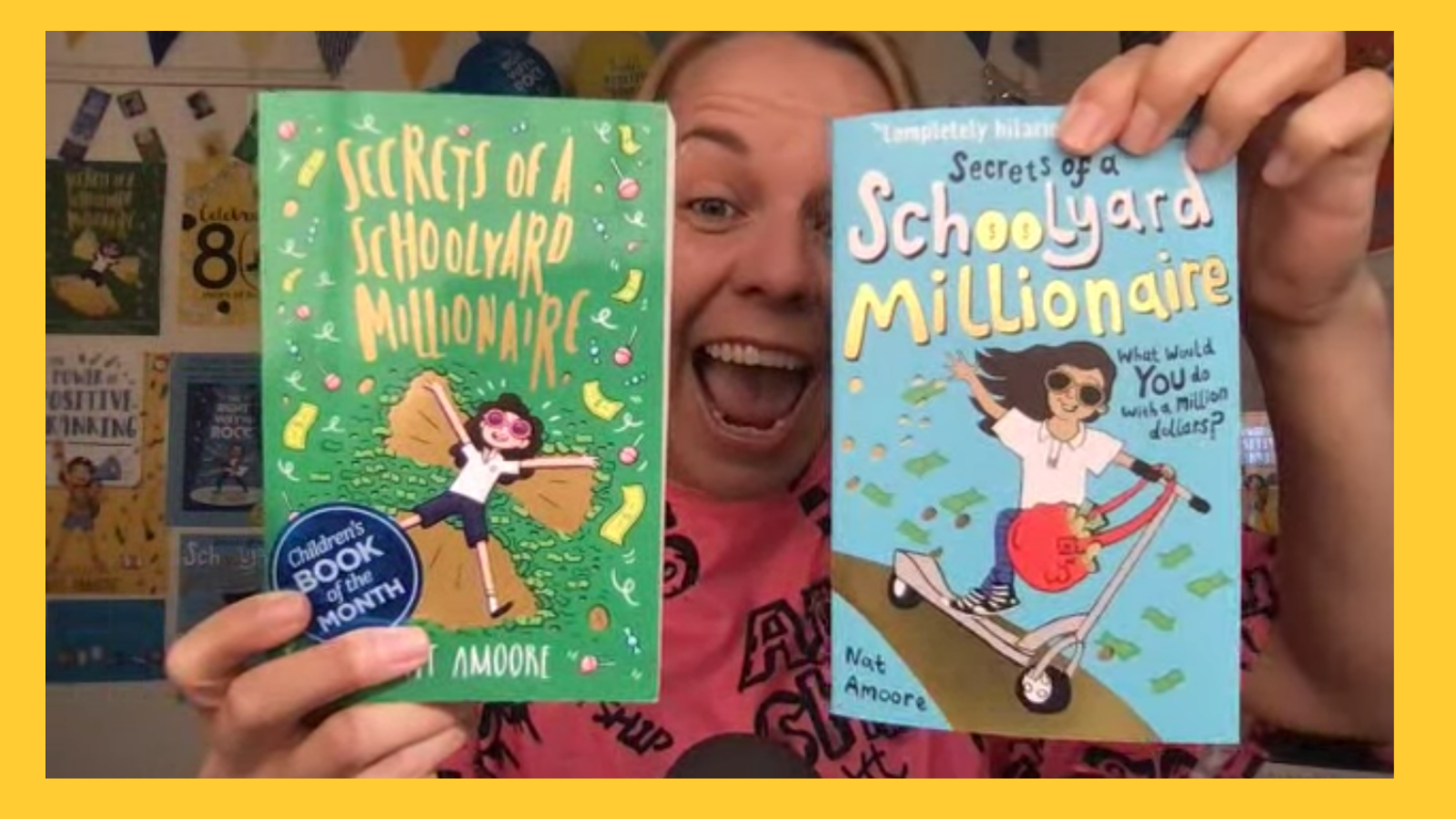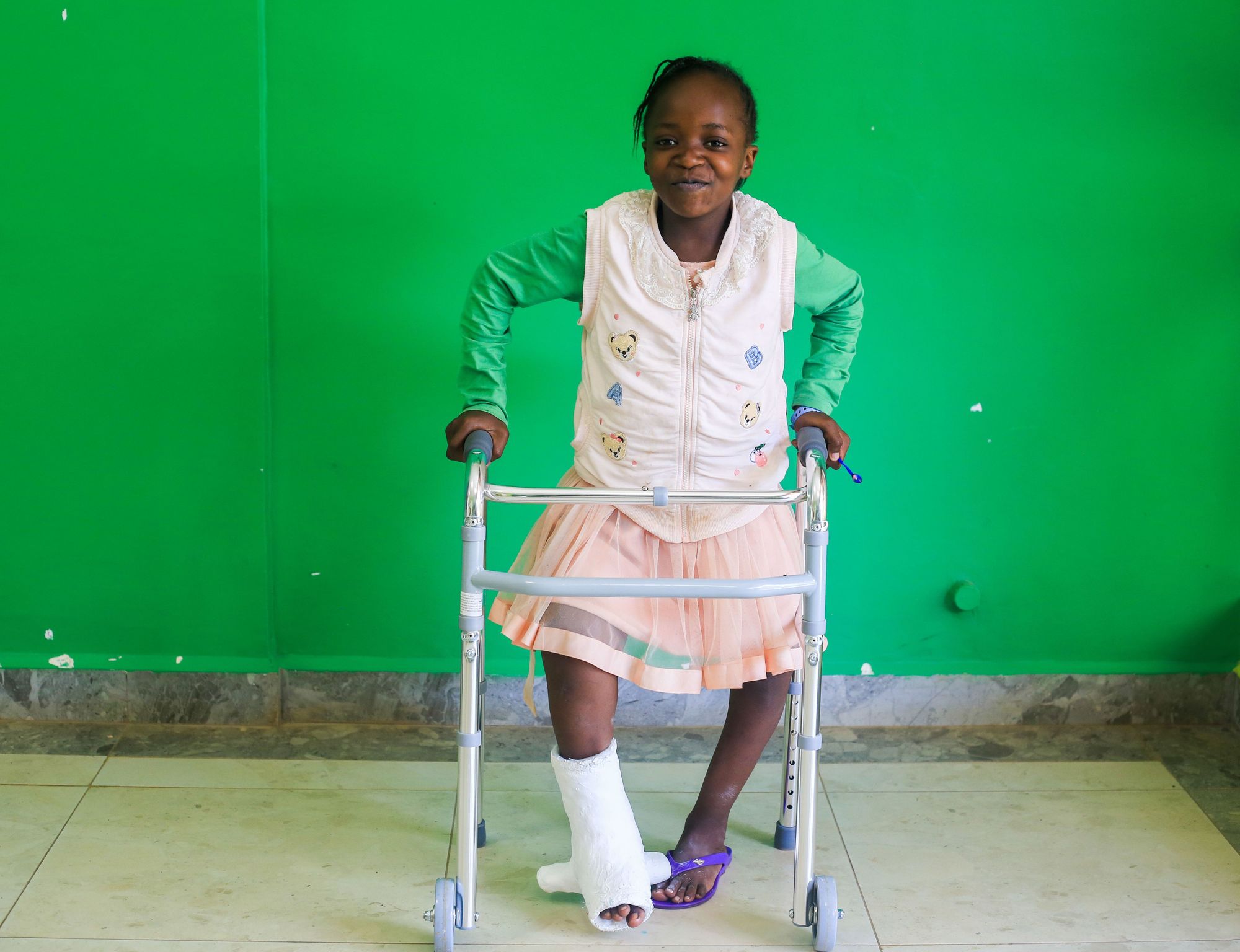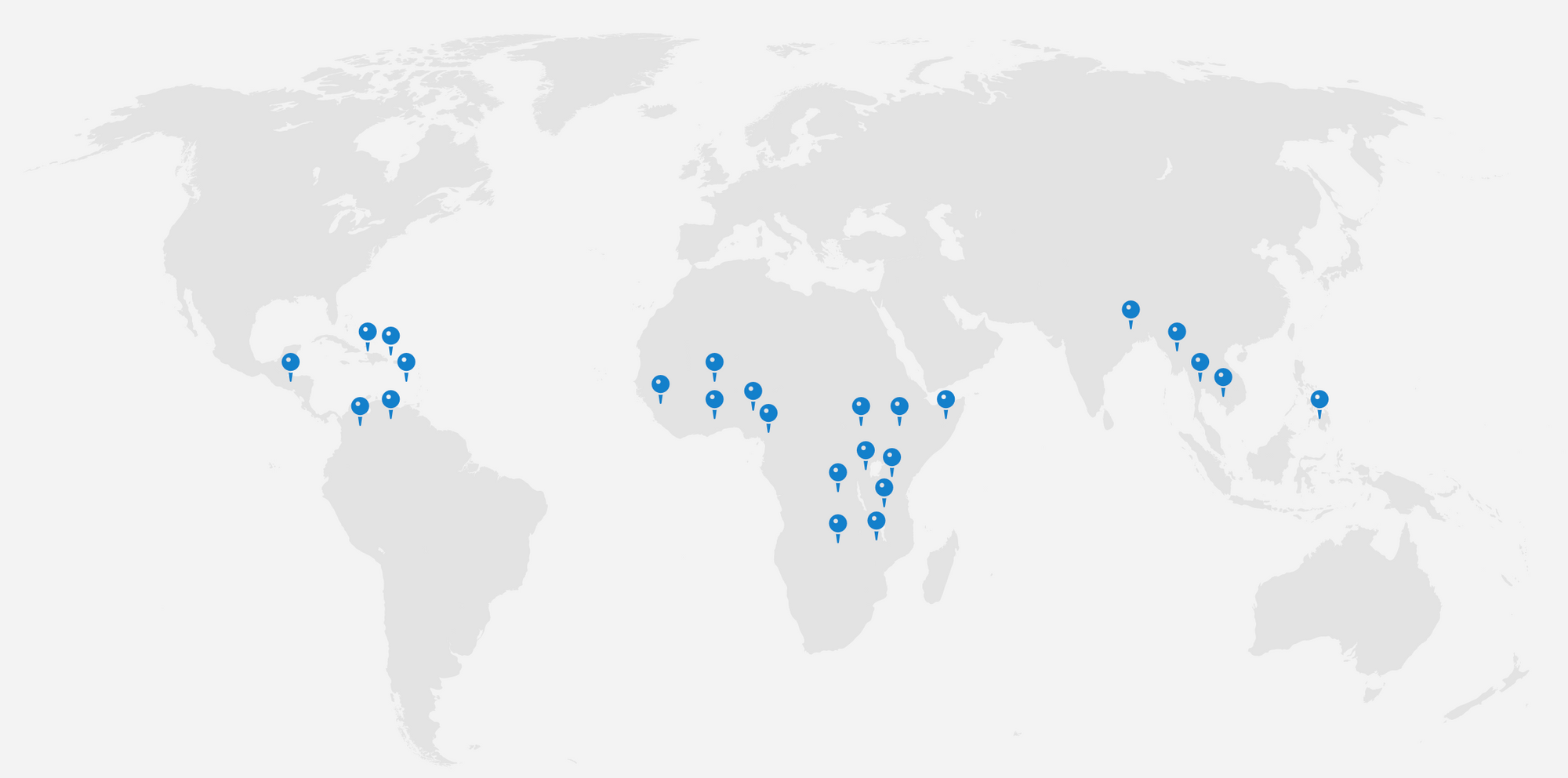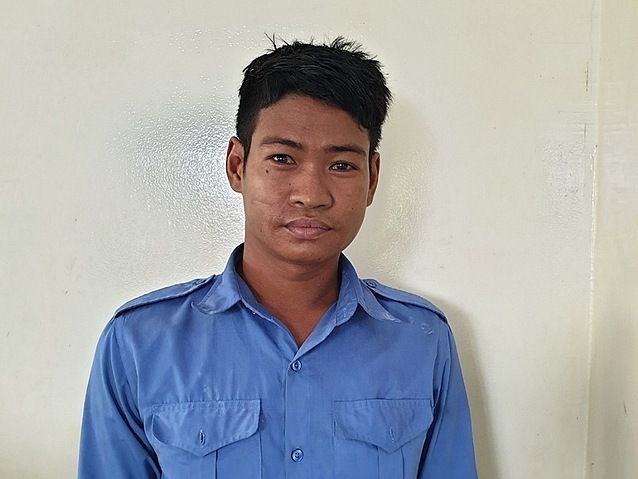We had the BEST time connecting with kid's author-extraordinaire Nat Amoore and are excited to share our conversation with you. Hear all about Watsi's roots on a rural bus ride 🚌 in Central America, learn what Nat calls her "Monday morning slam dunk" 🏀 during COVID lockdown, see what's inspiring us about kids changing the world 🌏, and what YOU can do to join #TeamWatsi 🙌.
Prefer to read? Here's a few excerpts of our conversation. Enjoy! 🎉
Nat: Hi, everyone. I'm Nat and I'm an author of books, such as Secrets of a Schoolyard Millionaire.

I have a few books out in Australia, but Secrets of a Schoolyard Millionaire just came out in the U.S., which is super exciting. In this book, there's an amazing character called Toby, who is the most generous, wonderful person on the planet. He is really, really passionate about an amazing website called Watsi and Mackinnon is from Watsi. Can you give us a little bit of a rundown about Watsi?
Mackinnon: We love Toby over here. He's our #1 ambassador spreading the word about Watsi 🙌. Thanks for all the good Toby's doing!
I have the joy of running an amazing charity called Watsi. We're a website where anyone, anywhere around the world can go on and meet someone who is in need of life-changing health care. You can give as little as $5 and 100% of it directly goes to the care they need.

This could be children who are born with clubfoot. People who need cardiac surgery or cataract surgery. It's amazing to see the transformation that happens. We believe everybody has a desire to help others and want to make that easy and even fun. We love that Toby's found Watsi and I'm excited to share more about it with you all today.
N: I'd love to know more on how Watsi came about because it's huge now. You're in so many countries and all over the place, but I know that it started as something much smaller.
M: Like lots of great things, Watsi just started as an idea and a few volunteers with big hearts. Our co-founder Chase was serving in the Peace Corps in Costa Rica and he was wrapping up his time. He was traveling on a bus when a mom got on and needed support for her child who needed healthcare.
She walked up the aisle and Chase noticed little by little everyone gave. This was around the same time that everything we were doing was on the internet, everything was on our phones. Chase thought: my friends in San Francisco would love to help this woman. Isn't there a way we could also use the internet for good like this? No one had ever started a crowdfunding site for healthcare. So, he got together with a few friends and volunteers and they launched Watsi.
It was crickets at the beginning. Chase's mom donated, our co-founder Grace saw her family donate. But quickly the word spread. They put out an article and all of a sudden thousands of people got on. The site crashed, they funded every single case. They felt like there's really something to this, so they quit their jobs and now we’ve just celebrated Watsi's ninth birthday 🥳.
We've reached patients from 27 countries around the world. We have the most amazing doctors, nurses, social workers—these teams that are active in their community, they know who needs help and who this type of support would be absolutely life-changing for. It's really exciting to be a small piece of that and to share that with you all.

N: I'm a big fan of Watsi, which is why I wrote a character who was obsessed with Watsi. I go on quite often, not at a specific date but anytime—it's mostly Monday mornings—when I wake up and am just feeling a bit crappy, one of my favorite things to do is to go onto Watsi. You've shared that some people go on and they’ll donate to the first person that they see, but I have a habit of going through until I find someone who's almost fully funded. It's like my little Monday morning slam dunk. It is often only $25 or something like that.
When everything in the world feels so big, and you feel like you can't help, and you can't do anything, and it all seems a bit blahhh, then going on Watsi—knowing that $10 bucks here or there—can make such a big difference. So I'm on the website a lot.
When we did the American version of Secrets of a Schoolyard Millionaire, we do a little shout out that says did you know Watsi is a real website and it gives a bit of info. It was hilarious because the Australian version came out in 2019 and, when I wrote it, I checked on your website and at the time you had funded life-changing operations for over (scans book 👀) 4,600 people. Then when I came back to check for the U.S. version only a couple years later, I was like, oh, it is 22,000!
M: I know our community is unreal. Unreal. Isn't that phenomenal?
N: I'm pretty sure Apple hasn't grown that much. So where are you at the moment?
M: We're at around 23,500 patients now. The response during COVID, it's what you're saying, it’s so hard for so many people right now. We all want a way to put some good light into the world right now and have a positive influence ✨.
When I talk to our community, they say “I love getting your emails.” Who likes getting emails? Our inboxes are crazy. But they say: “I love hearing from Watsi. It is the best part of my month when I get to see the patient I helped!” Our monthly donors get a surprise patient that they help every month. They often share that it's the best thing to get to know that they’ve been a small part of really helping change someone's life. It's phenomenal. I'm glad it brings you joy too.
N: That's so cool. The other thing that I really like about it is a lot of people are finding ways to cope. Like Sydney at the moment is in lockdown and has been for three months. It feels like a year we've been in lockdown. But, there's still some people who can work from home and financially it might not be affecting them as much, but mentally, I think it's hard on everybody. It's sort of that thing where some people might go: Oh, you know what? I might just do a bit of online shopping to make myself feel better. But I'm like, let’s do a little Watsi donation!
M: It's so true and you're not the only one. It's been so beautiful the way people have shown up for each other. There's so much bad news in the world, but we see such glimmers of humanity, people taking care of each other right now.
N: That's awesome. I speak to a lot of kids in schools about books and, in Australia, we have a public healthcare system. So the idea for Australian kids that if you're sick, you can't just go to the doctor or if you're hurt, you can't just get fixed, they don't quite understand because it's not the case here. I think even just talking to kids about how that isn't the case all around the world is really important.
M: What have you found resonates with kids? How do you approach talking to them about helping others?
N: With kids, it's really cool because when I go into schools, I'm talking about money, right? Like these kids find a million dollars! I incorporate it in a really fun way that gives them a bit of perspective, but then leads into: money is great, but isn't it even better when we use it for stuff that counts? That's the conversations that we start to have and talking about how big of a difference you can make with so little.
We talk about how much pocket money do you get a week? How do you spend it? If you donated regularly, even if it was just $1 or if you did a fundraising activity, how could you use that money? So all that kind of conversation. It's really amazing to see.
M: Kids totally get it. Starting about two years ago, we gave my kids Watsi gift cards for Christmas. They still got a Lego set—we didn't want tears—but they love it now. The stories of patients really resonate with them. That's what's so beautiful about Watsi—we've created a way for people to share their own story and for other people to connect with them. There's something special about the common human experience.

We had a dad on our site just this morning who was in a car accident and can't walk. He has three young boys: six, five, and three. I think about how stressed my own family is when I have a job, I have a partner, we have healthy kids. I put myself in that family's shoes and know that for this small amount of money, we can lift this huge burden off of them. Why would we not? Why would we not do that and be a part of that?
N: Goodness, it's so true. The other thing is because of the countries that you're working with, the amounts are so low. That's why it's really important to use things like the comparison of a cost of an Xbox for kids to realize you can literally save someone's life for the cost of their Christmas present.
It's not about wanting to take away from kids and them not having an Xbox or not having a Christmas present. You still get the Legos, but it's that concept. It’s empowering kids that they can make a difference. It's tangible. For me, one of the greatest things about Watsi is putting a face to it. You can see what you're doing. I think for kids that's really important. It's not this other, it's real, and it's in front of them.
M: Kids want to just be able to be kids. They want to go out and climb a tree and run around and play with their friends, and be able to get to school. Often I'm reading stories about our patients and they live far away and their experience is so different, but this underlying desire for a full life for the people you care about—we all have that.
Nat, you're such a leader in the power of storytelling. You're a master with weaving layers together in a way that resonates and makes it fun for people. Kids don't want to sit down and read an essay about “10 ways you should care about money and do good in the world”. But people are obsessed with Toby and his best friend and this amazing adventure they go on. They can put the book down. And then at the end, they're actually also a slightly better person.
N: It's hiding the veggies in the bowl of ice cream or bolognese sauce 🍝 or something like that. People have this opinion that stories either need to be fun or meaningful. My whole thing is that they can be both.
That's my whole thing when I set out: writing stories that are adventurous and fun and where the key characters have a lot of autonomy, they’re driving change, driving their own dreams, going for what they want, and standing up for what they believe in. So it is all really fun and adventurous, and, if you happen to learn something along the way, then that doesn't hurt either!
Any kind of message that's in the book, it is all character driven and it's all coming from stuff that I feel. I feel overwhelmed sometimes. I want to change the world. I want to make it a better place. I want to help people who are in a worse situation than me, but sometimes it all just feels too much. I think kids have that feeling too.
Kids know what's going on. They can see the problems in the world. Sometimes they feel really, really overwhelmed. They'll wake up wanting to cry because of something that they saw on the news, you know? I think finding ways to help kids feel like they are contributing—actually not just help them feel it but help them actually contribute, help them make change. Show them that they can put their stamp on the world. They can make a difference. It will help a lot of the anxiety that they're feeling.
It's not about hiding them from the news and pretending all the bad stuff's not happening, because in the world of information that we live in now, they're going to know, you can't protect them from it. What you can do is show them that they can help make change, stand up for what they believe in, and make the world better for somebody at some point.
When they get a bit older, if they want to become prime minister and run the country they can, but they don't have to wait until they're an adult to start making the world a better place.
And, while of course it will help the people that are getting helped, it also helps the people that are doing the helping, because it makes you feel less powerless. That's really important.
M: Oh, I love it. You're on #TeamWatsi. We all can make a change. If you're three years old or 93, we have a way to spread more kindness and care in our own community, with people all across the world, with people we've never met. We can actually be a part of making other people's lives easier. I'm really glad you found Watsi to do that.
I think it's really powerful, as you said, to actually feel a sense of who you're helping makes that feel so tangible and so real. Especially for kids to be able to see who they’re helping and who they're impacting, can only inspire more generosity in their lives and deepen the connection they have with empathy and understanding other people's experience in the world in a way that's really genuine and authentic for them.
When I think back on the last few years, some of the most inspiring moments I've seen have been led by students and kids having the chance to share their voice. They’re some of the most amazing leaders we have now.
N: You can talk metaphorically about how kids can make a difference and make change, but you also need to give them examples of you can do this today.
It's all very well to say “be nice to people”. Well, okay, cool. It's much better if you say, “see that kid over there, who's got no friends at the lunch table. Why don't you go and have lunch with them.” Or “see this website? If you take that $5 that you won at the school raffle, it's going to help that person. See that person right there.”
This is really important for parents or teachers. Kids want to be able to grab hold of it and see that they can do that thing. Watsi is so great for that.
M: I was talking with a mom, who has a few kids and they live in San Francisco, California. She had a great way of saying it. She said, from a very young age, I talked to my kids about save, spend, give. When they earned money for helping out or birthdays, that's their approach. You should save some for the future. You can spend some on something fun for themselves or a friend, and then you should give a little bit away to help others.
That's such a simple approach that makes so much sense. You can have the Wii and go play, but think about these other kids around the world too, and we can do something to impact their lives.
N: A lot of books are very right and wrong and my books cover the whole gray area in between. We tend to tell kids that there's right and wrong and we forget to discuss the gray area. Most of our life falls in the gray area! Can you do the wrong things for the right reasons? Those kinds of conversations are really important to have with kids and doing it through a storytelling is a really fun, safe way to do it.
Hope you've had just as much fun hearing about our conversation with Nat as we did chatting with her. Whether you're in need of your own Monday morning slam dunk or have a kid in your life you'd like to introduce to Watsi, we hope you'll take a moment to make a big difference for someone today.
The Watsi Team
Everyone deserves healthcare.